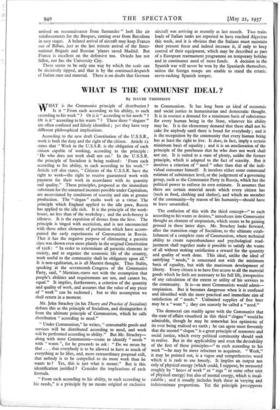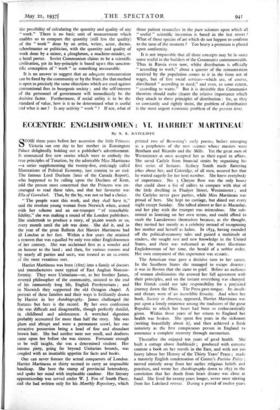WHAT IS THE COMMUNIST IDEAL
By DAVID THOMSON
WHAT is the Communist principle of distribution ? Is it " From each according to his ability, to each recording to his work " ? Or is it " according to his needs " ? Or is it " according to his wants " ? These three " slogans " are often confused and falsely identified ; yet they have very different philosophical implications.
According to the new draft Constitution of the U.S.S.R., work is both the duty and the right of the citizen. Article 12 states that " Work in the U.S.S.R. is the obligation of each citizen capable of working, according to the principle : ' He who does not work shall not eat.' In the U.S.S.R. the principle of Socialism is being realised : ' From each according to his ability, to each according to his work.' " Article 118 also states, " Citizens of the U.S.S.R. have the right to work—the right to receive guaranteed work with payment for their work in accordance with its quantity and quality." These principles, proposed as the immediate substitute for the unearned incomes possible under Capitalism, are necessitated by conditions of scarcity and aim at greater production. The " slogan " exalts work as a virtue. The principle which England applied to the idle poor, Russia has applied to the idle rich. It is the principle of the work- house, no less than of the workshop ; and the arch-heresy is idleness. It is the expulsion of drones from the hive. The principle is tinged with asceticism, and is not unconnected with those other elements of puritanism which have accom- panied the early experiments of Communism in Russia. That it has the negative purpose of eliminating a parasite class was shown even more plainly in the original Constitution of 1918 : " In order to exterminate all parasitic elements in • society, and to organise the economic life of the country, work useful to the community shall be obligatory upon all." It is non-egalitarian, as is all Marxist thought. Thus Stalin, speaking at the seventeenth Congress of the Communist Party, said, " Marxism.starts out with the assumption that people's abilities and requirements are not, and cannot be, equal." It implies, furthermore, a criterion of the quantity and quality of work, and assumes that the value of any piece of " work " can be reckoned ; but to this assumption we shall return in a moment.
Mr. John Strachey (in his Theory and Practice of Socialism) defines this as the principle of Socialism, and distinguishes it from the ultimate principle of Communism, which he calls distribution " according to need."
" Under Communism," he writes, " consumable goods and services will be distributed according to need, and work will be performed according to ability." But Mr. Strachey— along with most Communists—seems to identify " needs " with " wants ", for he proceeds to ask : " Do we mean by that . . . that everybody is to be allowed to have as much of everything as he likes, and, more extraordinary proposal still, that nobody is to be compelled to do more work than he wants to ? Yes, this is just what is meant." But is this identification justified ? Consider the implications of each formula.
" From each according to his ability, to each according to his needs," is a principle by no means original or exclusive to Communism. It has long been an ideal of economic and social justice in humanitarian and democratic thought. It is in essence a demand for a minimum basis of subsistence for every human being in the State, whatever his ability may be. It is the elementary demand that there shall not be cake for anybody until there is bread for everybody ; and it is the recognition by the community that every human being has at least the right to live. It does, in fact, imply a certain minimum basis of equality ; and it is an amelioration of the principle of the poorhouse that he who does not work shall not eat. It is suited to a state of plenty, unlike the former principle, which is adapted to the fact of scarcity. But it involves a criterion of " need " other than that of the indi- vidual consumer himself. It involves either some communal estimate of subsistence level, or the judgement of a governing group, such as the Communist Party in Russia, which has the political power to enforce its own estimate. It assumes that there are certain material needs which every citizen has (such as food, clothing and shelter), and which no member of the community—by reason of his humanity—should have to leave unsatisfied.
The confusion of this with the third concept—" to each according to his wants or desires," introduces into Communist thought an element of utopianism, which seems to be gaining ground in these latter days. Mr. Strachey looks forward, after the transition stage of Socialism, to the ultimate estab- lishment of a complete state of Communism, where technical ability to create superabundance and psychological read- justment shall together make it possible to satisfy the wants of all without making satisfaction a reward for the quantity and quality of work done. This ideal, unlike the ideal of satisfying " needs," is concerned not with the minimum basis of equality, but with the maximum development of liberty. Every citizen is to have free access to all the material goods which he feels are necessary to his full life, irrespective of any calculation of the extent or utility of his services to the community. It is—as most Communists would admit— utopianism. But it becomes dangerous when it is confused and identified with the more practical and immediate aim of satisfaction of " needs." Unlimited supplies of free beer may be a " want " ; they can scarcely be called a " need."
The democrat can readily agree with the Communist that the state of affairs visualised in this third " slogan " would be admirable, though he may be somewhat less optimistic of its ever being realised on earth ; he can agree most fervently that the second " slogan " is a great principle of economic and social justice, which every political community should seek to realise. But in the applicability and even the desirability of the first of these principles—" to each according to his work "—he may be more reluctant to acquiesce. " Work," it may be pointed out, is a vague and comprehensive word which it is rash to use loosely. It implies an output not only of physical energy (which could, I suppose, be measured roughly by " hours of work" or " ergs " or some other unit of physical energy) but also of mental energy, which is incal- culable ; and it usually, includes both these in varying and indeterminate proportions. Yet the principle presupposes the possibility of calculating the quantity and quality of any " work." There is no basic unit of measurement which enables us to compare the quantity (still less the quality) of the " work " done by an artist, writer, actor, doctor, schoolmaster or politician, with the quantity and quality of work done by a miner, a ploughman, a machine-minder, or a hotel porter. Soviet Communism claims to be a scientific civilisation, yet its key-principle is based tacos this unscien- tific conception of " work " as something measurable.
It is no answer to suggest that an adequate remuneration can be fixed by the community or by the State, for that method is open to precisely the same objections which are used against conventional fees in bourgeois society ; and the self-interest of the personnel of government will immediately be the decisive factor. Furthermore, if social utility is to be the standard of value, how is it to be determined what is useful end what is not ? Is any activity " work " ? If not, what of those patient researches in the pure sciences upon which all " useful " scientific invention is based in the last resort ? What of those species of art which do not happen to conform to the taste of the moment ? Too heavy a premium is placed upon conformity.
It is not impossible that all three concepts may be in some sense useful to the builders of the Communist commonwealth. Thus in Russia even now, whilst distribution is officially " according to work," about a quarter of the remuneration received by the population comes to it in the form not of wages, but of free social services—which are, of course, distributed " according to need," and even, to some extent, " according to wants." But it is desirable that Communist theorists should make clearer the relative importance which they attach to these principles of distribution : for, as they so constantly and rightly insist, the problem of distribution is the most urgent economic problem of the present time.















































 Previous page
Previous page